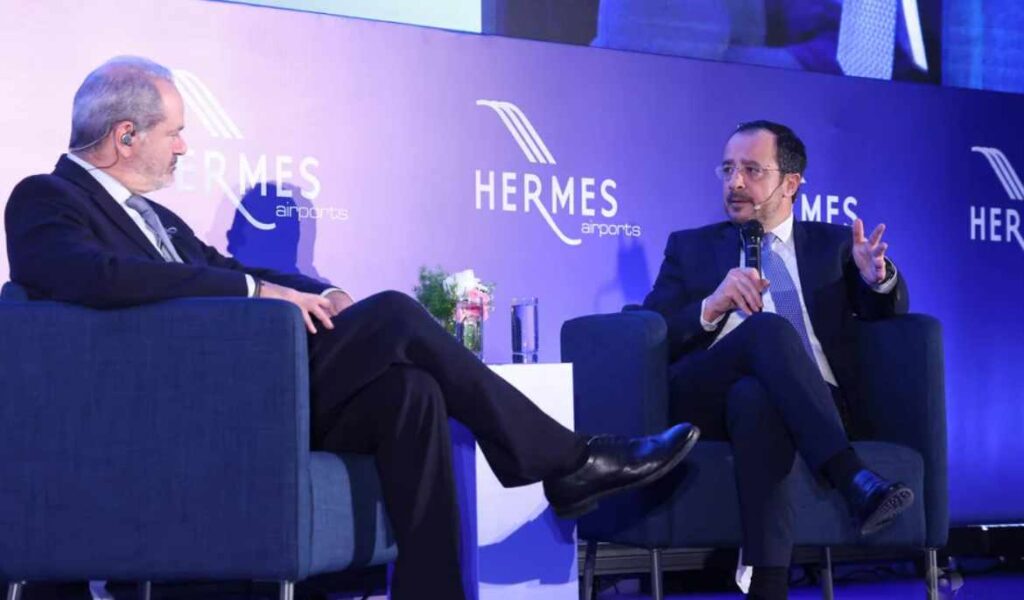Cyprus will resolve all technical issues necessary to join the Schengen area by 2025, President Nikos Christodoulides said on Friday. The political aspects of the matter have already been addressed, he added.
Cyprus and Ireland remain the only EU member states outside the Schengen area, as they have no land borders with other EU countries. Speaking at the “Beyond Sea and Sun” conference in Nicosia, organised by Hermes Airports, Christodoulides highlighted the benefits Schengen membership would bring to Cyprus, particularly in tourism and investment.
“We have addressed all political concerns regarding the ceasefire line and are now finalising the technical details required for accession,” he said. A dedicated team at the foreign ministry is overseeing this process.
The Schengen area, which spans over 4 million square kilometres and includes nearly 420 million people, comprises 29 countries. This includes 25 of the 27 EU member states, all members of the European Free Trade Association (Iceland, Liechtenstein, Norway and Switzerland), Croatia (since 2023), and Bulgaria and Romania (as of January 2025). According to the European Council, internal border controls with Cyprus remain in place, and Ireland is not part of Schengen.
Christodoulides also announced that Cyprus is in the final stages of lifting the US visa requirement for Cypriot travellers. A US delegation is expected to visit Cyprus soon, with announcements forthcoming.
The president discussed efforts to enhance tourism, including opening new embassies in Kazakhstan and Armenia to boost visitor numbers. These efforts aim to offset the loss of Russian tourists by attracting travellers from the United States and India.
He cited Poland as an example of successful diversification, noting that it has become Cyprus’ second-largest tourism market after the UK.
Christodoulides linked foreign policy to tourism, adding that the industry was also affected by policies on the economy, labour, education and culture.
“I believe it is important to have strong ties with all neighbouring countries, which are a source of tourism,” he said and referred specifically to Israel.
He specifically highlighted Israel, noting that political cooperation has addressed the tendency of Israeli tourists to visit the north.
In the meantime, he said, young people should turn to the tourism sector for careers.
The president encouraged young Cypriots to pursue careers in tourism, emphasising that visitors prefer interacting with locals, which fosters stronger bonds between tourists and the community.
To support this, the government is promoting technical schools to attract more young people to the industry.
Investments were also being made in Troodos, which lacked tourism infrastructure, he said.
Cultural tourism was also getting a push, as was sports tourism, with Fiba 2025 and marathons being hosted by Cyprus.
He also highlighted Cyprus’ upcoming EU presidency in 2026, which is expected to attract 200,000 visitors and has spurred discussions on direct flights between Larnaca and Brussels.
As regards results so far, Christodoulides said 2024 was a record year for tourism, as Cyprus broke the 4 million tourist barrier and recorded a revenue of around €3 billion, which contributed 13.5 per cent to the country’s GDP, up from 12.8 per cent in 2023.
Airports saw 10.5 million travellers and Cyprus has been included among the 30 best destinations, a strong indication of Cyprus’ resilience and prospects for tourism, he said.
Christodoulides said cooperation between the public and private sector in tourism was important.
He also referred to investments in airports and the recent agreement with Hermes Airports to expand them, which indicated the increase in demand.
“Cyprus’ airports today cannot be compared to those 20 or 30 years ago – we used to have 20 airlines and today we have about 55,” he added.



